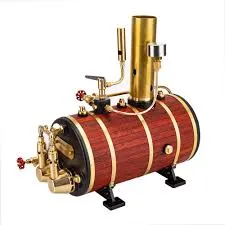
Jul . 24, 2024 02:48 Back to list
Understanding Biomass Boilers and Their Role in Sustainable Energy Solutions for Heating Needs
What is a Biomass Boiler?
In recent years, the demand for sustainable energy solutions has increased significantly due to growing concerns about climate change and rising energy costs. Among the various renewable energy technologies, biomass boilers have emerged as a viable and eco-friendly option for heating and hot water production. But what exactly is a biomass boiler, and how does it work?
A biomass boiler is a type of heating system that uses organic materials as fuel to generate heat. Biomass fuels can include wood pellets, chips, logs, agricultural waste, or other biodegradable materials. Unlike traditional fossil fuel boilers, which release greenhouse gases when burned, biomass boilers are considered carbon-neutral. This is because the carbon dioxide released during combustion is roughly equivalent to the amount absorbed by the plants during their growth, making it a more sustainable choice.
What is a Biomass Boiler?
One of the primary advantages of biomass boilers is their versatility. They can be used in both residential and commercial settings, with systems available in various sizes to meet different heating needs. Furthermore, biomass fuels can often be sourced locally, which helps support local economies and reduces transportation emissions. The use of waste materials, such as agricultural residues, not only minimizes waste disposal issues but also offers a cost-effective fuel source.
what is a biomass boiler

Additionally, biomass boilers can contribute to energy independence, reducing reliance on imported fossil fuels. As countries around the world seek to transition to more sustainable energy systems, biomass offers a practical solution that can help meet energy demands while reducing environmental impact.
However, it's important to recognize that biomass boilers also come with some challenges. The type of fuel used can affect the efficiency of the system, and not all biomass materials are created equal. For instance, wet or poorly managed biomass can lead to inefficient combustion and increased emissions. Therefore, it's essential for users to select high-quality fuels and maintain their boilers adequately to ensure optimal performance.
Furthermore, while biomass is a renewable resource, the sustainability of its use depends on responsible sourcing and management practices. Unsustainable harvesting of biomass resources can lead to deforestation, loss of biodiversity, and other environmental impacts. To mitigate these issues, regulations and standards have been developed in many countries to promote sustainable biomass production.
In conclusion, biomass boilers represent a promising and sustainable energy solution for heating applications. By utilizing renewable organic materials, they provide an alternative to fossil fuel-based heating systems while contributing to carbon neutrality and energy independence. However, users must be mindful of the fuel they choose and the sustainability of their sourcing practices. As the world continues to seek ways to combat climate change and move towards a greener future, biomass boilers are likely to play an important role in the transition to renewable energy systems. Their ability to provide efficient heat while reducing environmental impact makes them an attractive option for both residential and commercial applications.
-
High-Efficiency Commercial Oil Fired Steam Boiler for Industry
NewsJul.30,2025
-
High-Efficiency Biomass Fired Thermal Oil Boiler Solutions
NewsJul.30,2025
-
High Efficiency Gas Fired Thermal Oil Boiler for Industrial Heating
NewsJul.29,2025
-
High-Efficiency Gas Fired Hot Water Boiler for Sale – Reliable & Affordable
NewsJul.29,2025
-
High Efficiency Biomass Fired Hot Water Boiler for Industrial and Commercial Use
NewsJul.29,2025
-
High-Efficiency Biomass Fired Hot Water Boiler for Industrial Use
NewsJul.28,2025
Related PRODUCTS






















